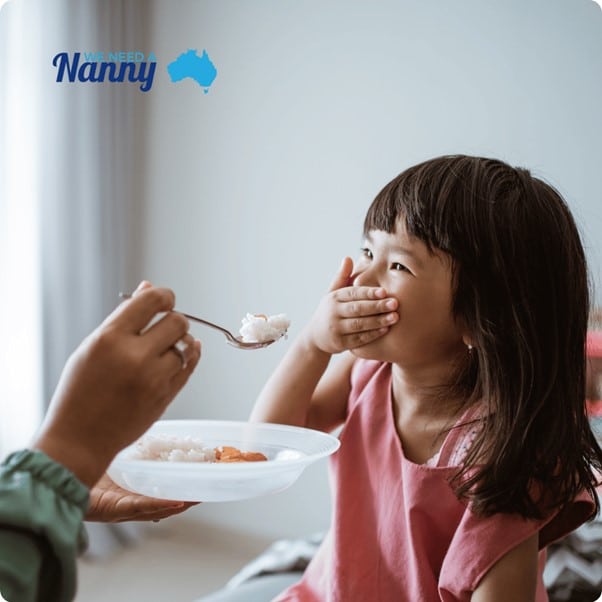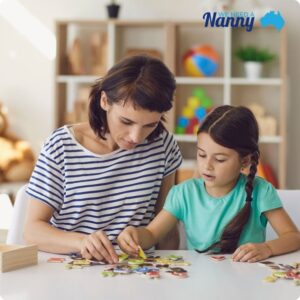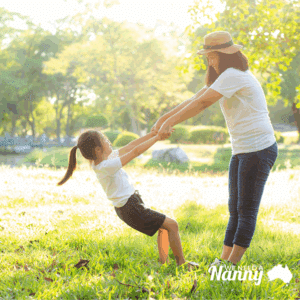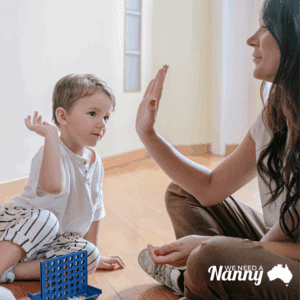Hiring a governess can provide numerous benefits for families looking for personalised and specialised care for their children, particularly in remote areas. A governess is typically a highly educated and experienced individual who can offer academic support, mentorship, and guidance to children in a one-on-one setting.
The Essential Duties of Governessing involves tailoring their care and teaching methods to suit the unique personality and interests of each child. This ensures that they receive a high-quality education that meets their individual needs.
Additionally, a governess can also serve as a positive role model for children, helping to instil values, manners, and discipline in a way that complements the family’s values and beliefs.
What Is a Governess?
A governess, sometimes called a “govie”, comprehensively carries out child care responsibilities in family homes, particularly in rural and remote areas, with a focus on education. The word governess is often an alternative term used instead of a teacher. Other terms, like educators and house tutors, are also used to describe individuals in this role.
Discover the Private Household Role of a Governess
Governesses play a crucial role in the education and upbringing of children within a private residence, typically during school hours. A Governess is responsible for teaching, disciplining, and morally guiding the children.
The role of a governess extends beyond academic education to include behaviour management strategies, language development, and social development. They help in bathing the children, facilitate care within the home of their families, and provide daily feedback to parents on the child’s progress.
Governesses also focus on instilling good manners and values in children, working closely with parents and other family members to ensure a holistic approach to the child’s development. While the responsibilities of governesses have evolved, their role remains significant in the childcare system, especially as an educator for children in remote areas.
What are the qualities of a governess?
Qualifications
In addition to experience and knowledge, a governess needs to possess the necessary qualifications to excel in their role. This may include a degree in early childhood education, teaching certifications, or relevant training in child development. These qualifications effectively provide a governess role with a strong foundation of theoretical knowledge and practical skills that enable a governess to meet the unique needs of the children they work with.
WWCC Checks and Background Checks
To prioritise the safety and well-being of the children under their care, a governess needs to undergo both a WWCC (Working with Children Check) and background checks. These checks involve evaluating the governess’s eligibility to work with children, which includes background checks for criminal records or any past incidents that could potentially endanger children.
Experience Working with Children
One of the essential qualities of a governess is experience working with children. A governess should have hands-on experience in caring for and educating children of different ages. This experience helps them understand the unique needs and developmental stages of each child they work with. It also allows them to build a strong rapport with children, establishing trust and a positive relationship.
Knowledge of Age-Appropriate Activities and Milestones
A governess needs to have a good understanding of age-appropriate activities and milestones for kids. They should know the different stages of development that children go through at various ages. With this knowledge, they can create enjoyable and educational activities that cater to a child’s specific developmental requirements.
Familiarity with Discipline and Behaviour Management Techniques
A governess should be familiar with discipline and behaviour management techniques. They should have strategies in place to guide children’s behaviour positively and constructively. By setting clear boundaries and expectations, a governess can help children develop self-discipline and learn appropriate behaviour.
Patience and Adaptability
Patience and adaptability are crucial qualities for a governess to possess. Working with children requires a great deal of patience as they explore, learn, and make mistakes. A governess should be patient in their interactions, allowing children the time and space to grow and develop at their own pace.
Alongside patience, adaptability plays a crucial role for a governess. Every child is distinct and may possess diverse learning styles, preferences, and needs. Therefore, a governess must be flexible in their teaching methods, tailoring their approach to different subjects to accommodate each child’s unique requirements.
Excellent Communication Skills
Effective communication is a vital skill for a governess to possess. They should have excellent verbal and non-verbal communication skills to engage with children, parents, and other members of the household. Clear and open communication helps establish positive relationships and fosters a collaborative environment.
Professionalism and Discretion
Professionalism and discretion are essential qualities for a governess. They should professionally conduct themselves, maintaining confidentiality and respecting the privacy of the family they work for. A governess should adhere to ethical standards, displaying integrity, honesty, and reliability in their actions.
The Essential Duties of Governessing
Families usually employ governesses to educate and care for their children within their home, and they will typically reside in the home of the family in remote and rural areas.
What is the role of a governess?
A governess in a private household is responsible for the education and care of the children in the family, blending teaching and childcare in a formal and specialised role distinct from other professionals or that of a nanny.

Education and One-On-One Tutoring
One of the primary responsibilities of a governess is to provide education and one-on-one tutoring to the children under their care. They create personalised learning plans based on each child’s abilities, interests, and educational goals. Governesses may develop and implement lesson plans, teach various subjects, and assess the children’s progress.
Through one-on-one tutoring and academic mentoring, governesses can provide individualised attention and support to help children excel academically. They offer guidance, clarification, and additional practice to reinforce concepts and ensure a comprehensive understanding of the material.
Creating a Structured and Disciplined Environment for Children
Governesses play a crucial role in creating a structured and disciplined environment for children. They establish and enforce rules, routines, and boundaries to promote a sense of stability, order, and responsibility.
Governesses may implement behaviour management strategies, teach social skills, and encourage positive values and attitudes. They provide guidance and support to help children develop self-discipline, respect for others, and a strong work ethic.
The Childcare and Developmental Role of a Governess
Along with their educational responsibilities, governesses also have a significant role in childcare and child development. They ensure the overall well-being and safety of the children, attending to their physical, emotional, and social needs.
Governesses may plan and engage children in age-appropriate activities, promote healthy habits and routines, and foster positive relationships. They provide emotional support, guidance, and encouragement, helping children build self-confidence, resilience, and independence.
The Household Management Duties of a Governess
In addition to their childcare and educational responsibilities, governesses may also have household management duties. They may be responsible for organising and managing the children’s schedules and coordinating appointments and extracurricular activities.

Governesses may also assist with meal planning, grocery shopping, and supervising meal times. They may oversee the children’s personal hygiene, wardrobe, and room organisation, ensuring cleanliness, tidiness, and age-appropriate routines.
Organising and Taking Part in Social, Cultural and Recreational Activities
Governesses often organise and participate in social, cultural, and recreational activities for the children. They may plan outings to museums, parks, or other educational and recreational venues. They encourage the children to explore new interests, engage in hobbies, and develop a well-rounded personality.
Governesses may also facilitate social interactions with peers, arrange playdates, and coordinate participation in community events. They play an active role in broadening the children’s horizons, fostering cultural awareness, and promoting a healthy and balanced lifestyle.
Constant Communication with Parents
A governess plays a vital role in maintaining open and effective communication with parents. They bridge the gap between the children and their parents, ensuring accurate and prompt relay of important information. The teachers ensure that they share regular updates on the children’s progress, behaviour, and any concerns with the parents to keep them informed and involved in their child’s development.
Additionally, a governess may also communicate with parents to discuss educational goals, curriculum choices, and any specific needs or requirements for the children’s learning and development.
Working in Collaboration with Household Staff and Nannies
Collaboration with household staff and nannies is an essential aspect of a governess’s role. They work together as a team to ensure the smooth running of the household and provide comprehensive care for the children. Effective communication, coordination, and cooperation with other staff members are crucial to maintaining a harmonious and efficient environment.
Governesses may collaborate with nannies to divide responsibilities and create a schedule that meets the children’s needs. They may also work closely with other domestic staff, such as housekeepers or chefs, to ensure the children’s daily routines, meals, and activities are well-coordinated.
Travelling with The Family
Many governesses are required to travel with the family, especially if they serve in a full-time, live-in position. Travelling with the family allows the governess to provide continuous care and support to the children, even when they are away from home.
During travel, governesses may be responsible for organising and supervising educational activities, ensuring the children’s safety, and maintaining their routines. They may also assist with packing and unpacking belongings, arranging transportation, and managing logistics to ensure a smooth travel experience for the family.
As a last thought, you may be wondering the Difference Between a Governess and a Nanny?
Generally speaking, nannies or caregivers are more concerned with the daily care and nurturing of children, while a Governess focuses more on the children’s education and development. This is why most governesses direct their efforts towards school-aged children, rather than younger children.
How Common are Governess Jobs?
Though hiring a governess is more prevalent in European countries, governess jobs are becoming more and more popular in other countries as well, especially in rural Australia.
Is a Governess Suitable for Primary School Children?
Families generally hire a governess for children who are schooling, rather than younger children. Primary school to High school children receive the most benefits from having a governess.
Can my Governess Help Children Return Completed School Work?
Families employ a governess to facilitate care and education within the family home. They usually help children with homework and tasks. They facilitate the process of returning completed school work.





